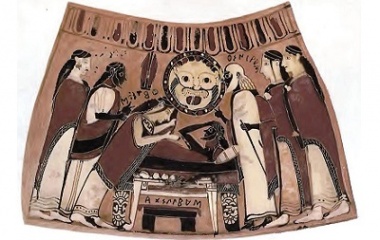- Pronunciation: puh-TROH-kluh-s
- Origin: Greek
- Role: Hero
- Symbols: Achilles, Death
- Siblings: None
- Children: None
- Other Names: Patroklos
Who Is Patroclus?
Greek mythology shows that Patroclus was the son of Menoetius, one of the Argonauts. The identity of his mother is unknown, with the names of many different women documented in different stories. He was the best friend of the well-known hero Achilles. They fought together in the Trojan War, which would eventually become the legacy left behind by Patroclus.
Origins
The story of Patroclus is found in the Iliad. He was the son of Menoetius, who had at least four marriages. This is why the exact identity of his mother is unknown.
While he was still a child, Patroclus found himself in an argument with one of his close friends as they played dice. His friend, Clysonymus, argued with Patroclus, and things quickly escalated. As the argument became more heated, an accident occurred and Patroclus unintentionally killed his friend. To avoid dealing with the family of the deceased, Menoetius took his son to Phthia. It was here that Patroclus met Achilles. They instantly became great friends and their friendship would play a large role in the Trojan War.
Legends and Stories
Patroclus played an important role in the outcome of the Trojan War. It is not an exaggeration to say that the war could have had an entirely different outcome without his part in it.
Patroclus the Soldier
Patroclus and Achilles were already good friends when they both wanted to pursue Helen. Helen was already engaged, however, so they took the Oath of Tyandareus, which stated that all suitors of the beautiful Helen would promise to protect both her and her future husband from any type of danger or threat.
Helen married her fiancé but quickly eloped with Paris, the prince of Troy. Her husband, Menelaus, quickly invoked the Oath of Tyndareus, which brought all of Helen’s previous suitors together, including Patroclus and Achilles. This was essentially the start of the Trojan War, which would last 10 long years and result in tremendous loss of life for both the Greeks and theTrojans.
While the Trojan War raged on, Patroclus began to build his battle skills. He was no match for Achilles but he was inspired to become better. The Trojans had eventually advanced and were beginning to threaten Greek ships. Confident in his capabilities, Patroclus convinced his friend to let him lead the army and force the Trojans away from the ships. Achilles eventually agreed and let him take his army to battle. Before Patroclus left, Achilles warned him to only push the opposing army back. He wasn’t to attack.
Patroclus was successful in his quest and saved the ships. The enemy was repelled but this wasn’t enough for him. He didn’t listen to Achilles’ warning and he commanded the soldiers to attack the Greeks. This resulted in the death of many Trojan soldiers and heroes. The god Apollo was furious with Patroclus’ actions and stunned him. This allowed him to be sought out by Hector, the son of the Trojan King and Paris’ brother. Hector killed Patroclus, which would prove to be a catalyst for the end of the war.
Achilles was devastated when he learned of Patroclus’ fate. He blamed himself and wanted nothing more but to turn back the hands of time and stop destiny. Once Patroclus’ body had been retrieved from the opposing army, Achilles was filled with rage and attacked the Trojans with more fury than they had experienced so far in the war.
Achilles sought revenge for his friend and managed to kill Hector. To pour salt in the wounds of the Trojans, he dragged their hero’s body with his chariot, disrespecting the memory of Hector and breaking down his father, who had lost several sons in the war.
This incident was the turning point in the war. The Trojans had lost their hero and the war quickly ended. Even though Achilles had managed to avenge his friend’s death, he wouldn’t escape his actions. He knew that before he even pursued Hector, he would pay the ultimate consequence for his decision, just as Patroclus had. Paris, Hector’s brother and the man responsible for the start of the Trojan War, shot an arrow at Achilles’ heel, the only vulnerable part on his entire body. The tip of the arrow carried poison and killed the Greek hero. He was cremated and his ashes were mixed with Patroclus’, their unbreakable bond lasting even into the afterlife.
Family
While Patroclus did not have an immediate family of his own, the family that he did have around him were very important.
Menoetius
Menoetius was Patroclus’ father. He was a Titan god and was known for his violent anger and rash actions. A small amount of this trait that may have been passed on to his son, as his decisions eventually led to his demise.
Mother
Patroclus’ father was married four times. It is unclear which of these women his birth mother was. Apollodorus of Athens has identified three women as being the possible mother of Patroclus, including Periopis, Polymele and Sthenele. Gaius Julius Hyginus identified the fourth wife of Menoetius, Philomela, as Patroclus’ mother.
Achilles
Though not family, Patroclus and Achilles could not have been any closer. They have been described as being closer than brothers. Some scholars have even speculated that they may have been lovers, but the evidence for this claim varies between sources.
Appearance
In almost every artistic representation of Patroclus, whether sculpted or painted, he is dead. The representations mainly focus on those closest to him in mourning. The best-known picture of him alive doesn’t show his face. Instead, his naked body faces away from the viewer, seeming to symbolize the vulnerability that he is unaware of.
Symbology
As morbid as it may seem, Patroclus is symbolized by death. His life was cut short by his own poor decisions and his uncontrollable anger towards the Trojans. He wanted to be just like his friend and hero Achilles, but his battle skills were not advanced enough. Instead of heading Achilles’ warning, Patroclus attacked Troy and Hector. If only he had simply listened to his friend, he could have been saved.










